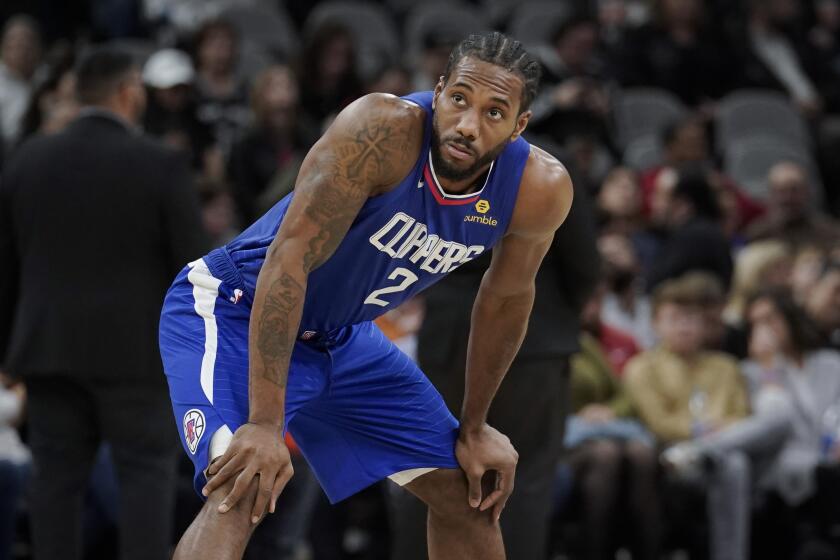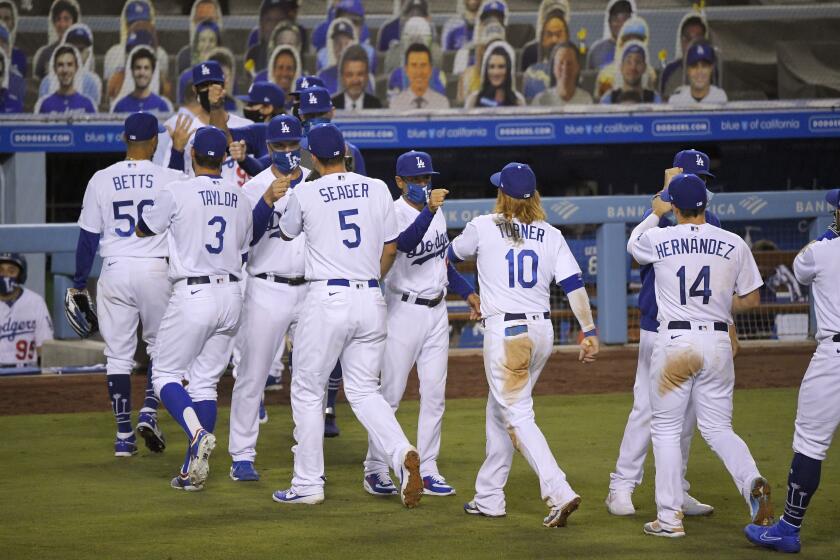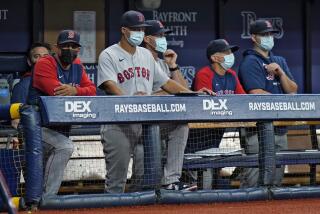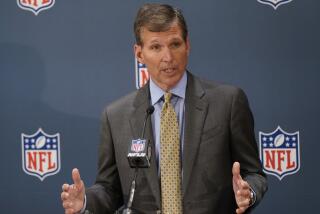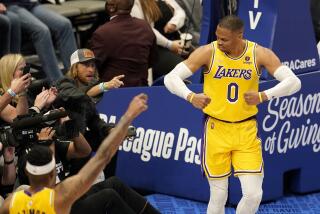How many positive COVID-19 tests would it take to shut down sports again?
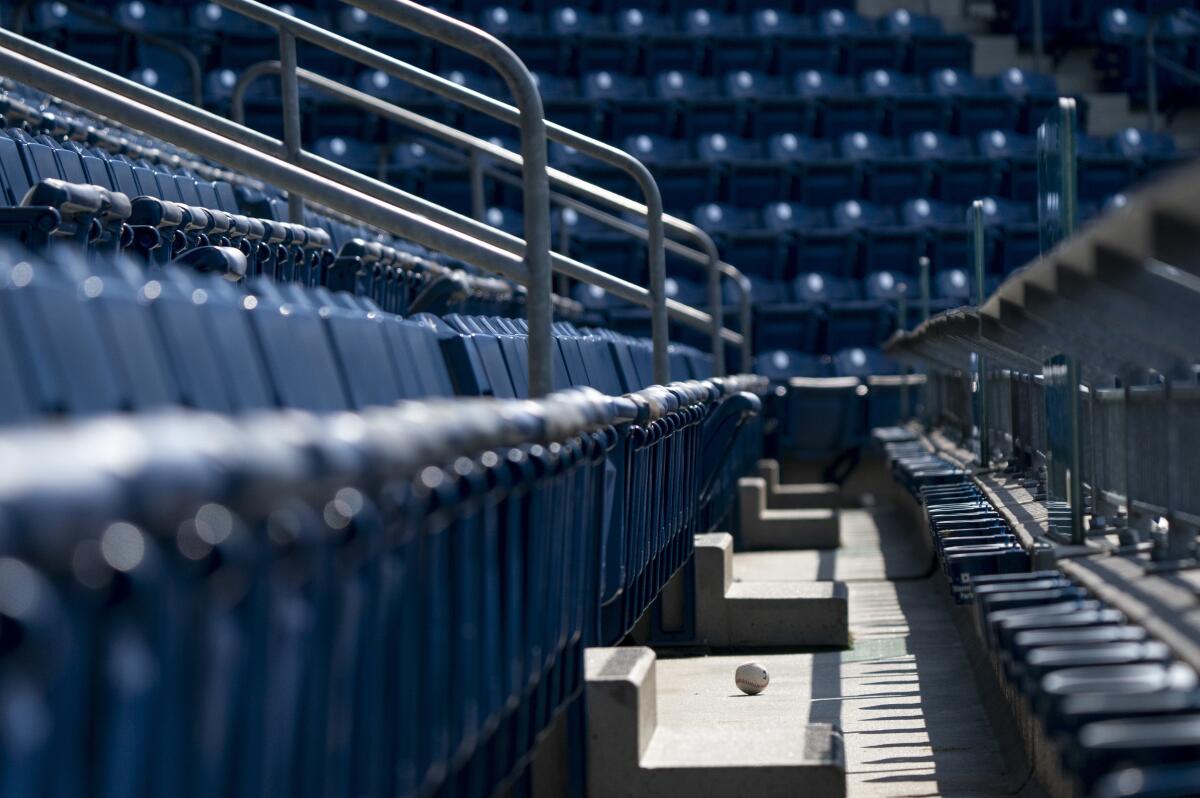
- Share via
From the moment North American sports leagues announced their plans to start or restart their season while masked and sanitized and playing before eerily empty stands, the question wasn’t if some athletes would test positive for COVID-19, but when.
The second question was how many positives tests would be too many for that team — or a league — to continue playing. One? Probably not. A player could be isolated and replaced. Two? Still not many and not enough for everything to come crashing down, because rosters were expanded to allow for the possibility of a couple of positive tests and a couple of injuries stemming from the shortened preseason.
Would three positive tests be enough? Four?
How about 13? Apparently not.
The NBA is ready to resume its season Thursday and a big unknown are the long-term health concerns if players get infected with COVID-19.
Major League Baseball reached a moment of truth on Monday, when a COVID-19 outbreak that hit at least 13 members of the Miami Marlins led Commissioner Rob Manfred to cancel the Marlins’ home opener against Baltimore. The New York Yankees’ game at Philadelphia was collateral damage, called off because the Yankees would have used the same clubhouse the Marlins occupied over the weekend. Manfred said the Marlins won’t play Tuesday but will play at Baltimore on Wednesday “if the testing results are acceptable.” Note that he said “if,” emphasizing the precarious nature of the setup behind this contrived 60-game schedule.
MLB owners met by phone Monday and decided not to cancel the season. Their collective response seems to consist of urging teams to ramp up their cleaning efforts, reminding players not to spit or share high-fives, and then hoping for the best, a confirmation — as if there were really any doubt — that money is driving this madness.
“Now we REALLY get to see if MLB is going to put players’ health first,” Dodgers pitcher David Price, who opted out of the season due to health concerns, said via Twitter. “Remember when Manfred said players’ health was PARAMOUNT?! Part of the reason I’m at home right now is because players health wasn’t being put first. I can see that hasn’t changed.”
According to published reports, members of the Marlins knew Saturday that four players had tested positive, but the team never considered asking for the game to be postponed. “We knew this could happen at some point,” shortstop Miguel Rojas said. “We came to the ballpark ready to play.”
The games will go on elsewhere, at least for now, but with heightened anxiety levels. “When something like that happens, it makes everybody a tick more nervous than they already are,” Angels pitching coach Mickey Callaway said in a videoconference with reporters.
Angels manager Joe Maddon, 66, cautioned against making sweeping statements until more is known about how the Marlins’ outbreak occurred and whether breached safety protocols had contributed to the spread of the virus. “I don’t want to be an alarmist,” Maddon said. “Too many times, I’ve seen conclusion-jumping.”
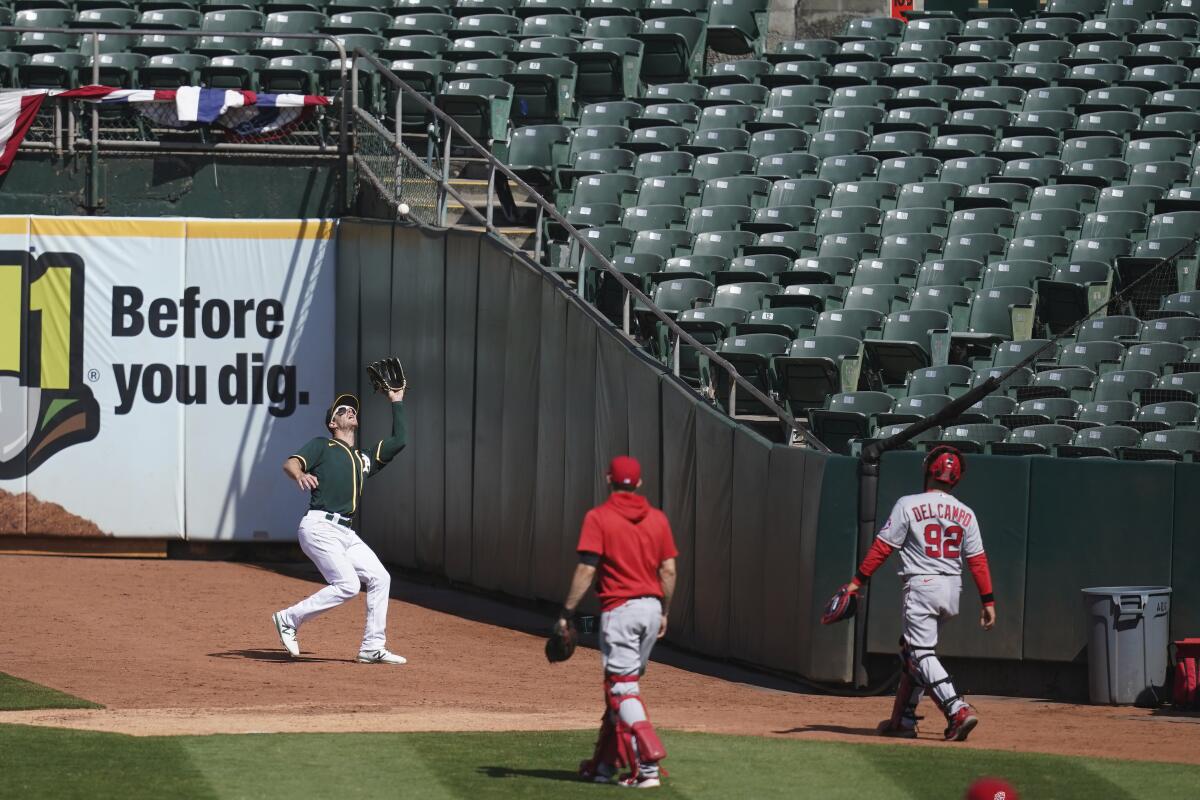
Also Monday, the NHL — which has moved its 24 teams to playoff bubbles in Edmonton and Toronto — announced no confirmed positive test results among the more than 800 players tested from July 18-25, while teams were still at their club’s in-season facilities. The NBA, which has held its training camp in Orlando, Fla., announced last Monday there were no positive tests among the 346 players tested at its campus between July 13-20.
The NHL went to Canada, where COVID-19 has largely been well controlled, to pull off its playoffs. That removes hockey even further from the attention of American fans but gives the league its best chance of completing the season and — yes — making enough TV revenue to compensate for some of the losses triggered by the pandemic. The NBA has been dealing with players going in and out of the bubble, but it has enforced strong quarantine rules. Keeping every team off flights and in Orlando for all the games should keep players safe and keep the NBA on track to finish the playoffs.
The National Women’s Soccer League and MLS had to send teams home in order to carry out their tournaments. The NWSL’s Orlando Pride pulled out of the Challenge Cup before teams traveled to the competition site in Utah; Dallas and Nashville withdrew from the MLS Is Back tournament in Orlando because each team had a number of positive tests. The NWSL season ended Sunday, while the MLS tournament continues.
The Dodgers consider the perils of travel after many Miami Marlins test positive for COVID-19, and revenge over the Astros’ sign-stealing is secondary.
NFL players began reporting to training camps Monday with hastily agreed-upon safety protocols and the question of how, with close contact essential, the league will avoid its own COVID-19 outbreak. The league canceled preseason games, and Commissioner Roger Goodell wrote a letter to fans telling them, “Adaptability and flexibility will be needed for the foreseeable future.”
No kidding. And here’s a sobering thought: The Minnesota Vikings announced that Eric Sugarman, their head trainer and infection control officer, had tested positive for COVID-19, as had his family members. “As I sit here in quarantine, it is clear this virus does not discriminate. It should continue to be taken seriously,” Sugarman said in a statement.
At least for now, baseball seems intent on continuing, even as the number of players testing positive takes worrisome precedence over the feats and personalities that bring the game to life. “We feel like the protocols have worked pretty well,” Manfred said. That’s not good enough. How many more positive tests will be enough for Manfred and owners to concede it wasn’t smart to play outside a bubble and to travel?
It would be tragic if the answer comes at the expense of the immediate or long-term health of players, coaches and other personnel, but that seems the most likely outcome.
More to Read
Go beyond the scoreboard
Get the latest on L.A.'s teams in the daily Sports Report newsletter.
You may occasionally receive promotional content from the Los Angeles Times.

